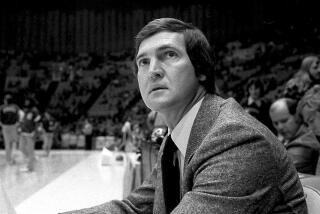NBA Rule Made It Exceptional
- Share via
Today, thanks to the NBA lockout, we find ourselves talking about the Larry Bird exception instead of Larry Bird’s election to the Hall of Fame.
The NBA hierarchy is foolish if it wants to get rid of the Bird exception, which allows teams to re-sign their veteran stars for any amount.
It’s a rule that helped bring the league to the status it enjoys now. Having franchise players stay with one team their entire careers builds identity and loyalty. Bird was a Celtic, Magic Johnson was a Laker, Michael Jordan was (?) a Bull.
The Bird exception made it almost financially impossible for star players to go anywhere else, because in most cases other teams did not have enough salary-cap room to pay them what they could make by staying home. The only superstar who changed teams through free agency was Shaquille O’Neal.
Now if the owners don’t like the huge salaries they have to pay as a result, they have only themselves to blame. As agents like to say, it takes only one team to set the “market” for a player. It’s up to the owners to keep themselves in check.
Larry Johnson had three years left on a $20-million contract--not much leverage, in other words--when Charlotte Hornet owner George Shinn gave him an extension worth $84 million.
It isn’t the players’ fault that Seattle felt compelled to offer $35 million to Jim McIlvaine, or that Portland wanted to pay Brian Grant $63 million, or that Vancouver decided Bryant Reeves deserved $65 million.
The old one-year “escape” clauses that helped salaries spiral upward came about because the Portland Trail Blazers wanted to pay Chris Dudley $4 million a year.
Those one-year out clauses were eliminated in the last collective bargaining agreement, but that led to a situations such as the Lakers’ current problem with Rick Fox; they aren’t allowed to pay him the going rate because he hasn’t been under contract for three years. The veterans should get the wage scale the union seeks for them.
The union seems willing to give on the rookie contracts and extend them to five years. The veterans used to gripe when draft picks got $70-million contracts, only to find out the new three-year wage scale meant players who hadn’t won a playoff game could get $100 million after two years.
The players also need to give up on marijuana testing. The privilege of playing in the NBA ought to be worth more than the chance to smoke a few blunts.
It should be so easy. But the league is going to make this difficult.
Do the owners really think a hard cap will solve all of their problems? It won’t take away their own competitive desires. If there’s a hard cap, teams will simply figure out ways around it, the way the San Francisco 49ers and Dallas Cowboys have in the NFL.
It’s inevitable. Almost as inevitable as the prospect of missing games looks right now.
The league is willing to risk its perfect record of never having lost a game to a work stoppage. The NBA may gouge fans at the box office, but at least it has always provided games for those willing to pay the price. That’s 51 years of trust and good will on the line.
The NBA can’t afford to lose the momentum it has gained. This is a sport whose championship games were still being televised on tape delay in Magic Johnson’s rookie year.
Take a look at hockey. Four years ago, the sport was riding high. What more could any sport ask for than a championship team from New York, in this case the Rangers, and the compelling saga of their first Stanley Cup since 1940?
The NHL folks fumbled that one away--in hockeyspeak, turned it over in their own zone--with a lockout that took away almost half of the next season. Now hockey barely registers on sports’ radar screen.
Baseball managed to recover from its disastrous strike in 1994. But it has been here longer, has a larger fan base and more tradition. Basketball would have none of that to fall back on, and there’s a good chance it won’t have Jordan to help out.
The only hope is that the people who run the NBA have shown themselves to be much more savvy than the folks who run baseball and hockey, that they know a good thing when they see it. Jerry Reinsdorf, the 1994 World Series wrecker, doesn’t have the clout in basketball that he does in baseball. He has been on the outs with the league ever since the Bulls won a court case that allowed them to keep showing their games on superstation WGN.
But even Reinsdorf must realize the value that comes with being able to pay Jordan as much as he can afford. That’s something Commissioner David Stern and the other owners have to understand.
By the way, congratulations, Larry.
More to Read
Go beyond the scoreboard
Get the latest on L.A.'s teams in the daily Sports Report newsletter.
You may occasionally receive promotional content from the Los Angeles Times.










